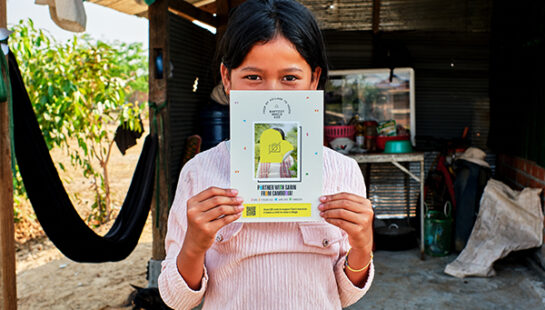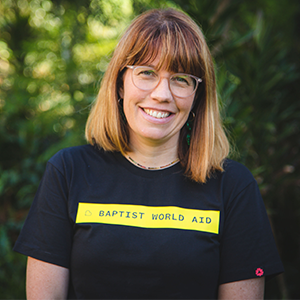2023 marks the tenth anniversary of Baptist World Aid’s first Ethical Fashion Report. Through ten years of advocacy, action, raising awareness, and holding companies to account, Baptist World Aid—alongside countless other organisations, advocates, and individuals—has pushed fashion closer towards becoming an industry that respects its workers and the planet.
The past decade has seen some major wins and losses for the world’s garment workers, and throughout the ups and downs, our Ethical Fashion Team have persisted in challenging some of Australia’s largest fashion companies on what they’re doing to create change.
Here’s ten things we’ve learnt from ten years of ethical fashion research and advocacy.
1. Paper policies aren’t cutting it.
One of the biggest areas of improvement our research has uncovered over the past decade has been the development of company policies, like supplier Codes of Conduct. While this is a great foundational step, it often fails to catalyse actual change in supply chains.
For example, our Special Edition Ethical Fashion Report found that in 2013, three quarters of all companies assessed had ‘freedom of association’ listed in their code, and in 2022, this remained high. But of the entire company cohort assessed in 2022, just 5% could evidence unions or collective bargaining agreements present for over three quarters of their suppliers.

Without these features in place, workers lack the ability to push back against power imbalances between themselves, their factory managers, and the fashion brands they’re producing for, and ultimately create the change required to eliminate exploitation and achieve payment of living wages.
2. Without high-level buy in, fashion companies struggle to move the needle.
Our researchers often work closely with fashion company employees who are passionate about doing the right thing by workers and the environment. However, without support from company executives and board members, their ability to implement stronger ethical sourcing policies and initiatives is limited. But when companies have sustainability KPIs and targets set by their board and executive leadership, they’re more likely to achieve greater, more genuine change.
3. Worker empowerment must be central to change.

Garment workers know better than anyone else what the factory conditions are like, and what changes could make a true difference. Their voices and lived experience must be centered in all initiatives which seek to improve their wellbeing, because without their experience, the initiatives risk being uninformed at best and a failure at worst.
Giving workers a collective voice–through unions or collective bargaining agreements–shifts the power imbalance away from factory management and fashion brands, and towards the workers themselves.
4. Supply chain tracing is the most pivotal step a company can take in their ethical sourcing journey.
Without knowing where their fibres, fabrics, and finished products are coming from, companies cannot put in place systems to protect their workers and the environment.
While this may sound basic, the majority of fashion companies are still surprisingly unaware of where most of their fabrics and fibres come from. This is incredibly concerning given the highest risk of modern slavery sits in these deeper tiers of the supply chain.
5. A lack of issues identified isn’t necessarily a good thing.
One of the biggest red flags for our research team is reading reports or hearing companies say, ‘We’ve never received any reports or found any issues of worker exploitation in our supply chain.’ Whilst this is often conveyed as a positive insinuation of ‘we’ve nothing to worry about’, what it tells us is that the company has failed to put in place the systems and processes that adequately capture problems as they’re occurring.
We know the fashion industry is one of the highest risk industries for worker exploitation globally. Companies must work on the assumption that there are issues in their supply chain. And they must work to uncover and remediate them as they arise. Only once this mindset is adopted can the core drivers of exploitation be addressed.
6. Collaboration is key.
True systemic change can only be achieved when companies, governments, NGOs, and global citizens work together. Issues such as modern slavery and living wages are complex, and change cannot be achieved by individuals alone.
Multi-stakeholder initiatives coupled with strong government policies, NGO advocacy, and ever-increasing public demand will be key to leveraging greater impact and long-term change.

7. ‘Critical friendship’ is essential in advocacy.
Our theory of change hinges on building strong relationships with fashion companies. When we’re invited into companies’ head offices to discuss ethical sourcing, we see these opportunities as privileges. We’re here–as part of the system–to assist companies on their journey.
Whilst maintaining good relationships is important, it doesn’t prevent us from having tough conversations and identifying poor practice when we see it. We believe we have more impact in the long-term as a ‘critical friend’ than a combative acquaintance who names and shames.
8. We can celebrate wins and still be disappointed at the lack of progress.

It’s important to celebrate progress along the journey, even when there’s still a way to go. Unfortunately, there’s no silver bullet that will solve the fashion industry’s myriad problems, so we’re conscious that its through small, incremental changes that the industry will evolve.
Celebrating the wins—no matter how ‘small’–is important for maintaining momentum and motivation on what is a long-term project.
9. Your voice has power.
When you share our Ethical Fashion Scorecard and tag a brand on social media, or use our Speak Out To Brands tool to send an email, brands are listening.
Our research shows that the 25 brands who have been included in the Ethical Fashion Report consecutively since 2013 outperform the entire 2022 clothing cohort by an average of eleven points. This speaks to the value of consistent, ongoing public accountability through advocacy efforts such as the Ethical Fashion Project.
10. There’s still a long way to go before fashion is synonymous with ‘ethical’ and ‘sustainable’.
The industry has made progress over the past decade. But the pace of change is not fast enough for the workers who are still being exploited and the planet which is still being degraded.
At Baptist World Aid we see a better world where all garment workers are treated with respect and dignity, can afford to support their families, and live and work in healthy and safe environments.
The Ethical Fashion Report isn’t going anywhere until this vision is the reality. Will you help us realise it?



 Meredith Benson,
Meredith Benson,

 Sophia Russell,
Sophia Russell,